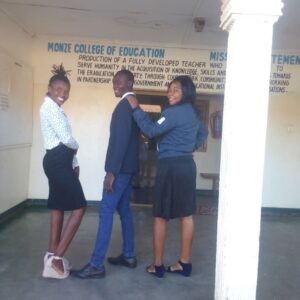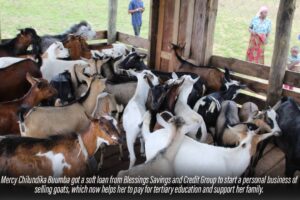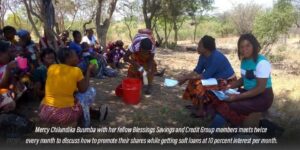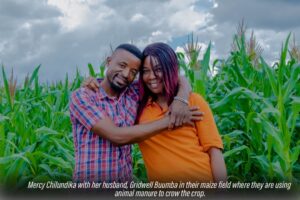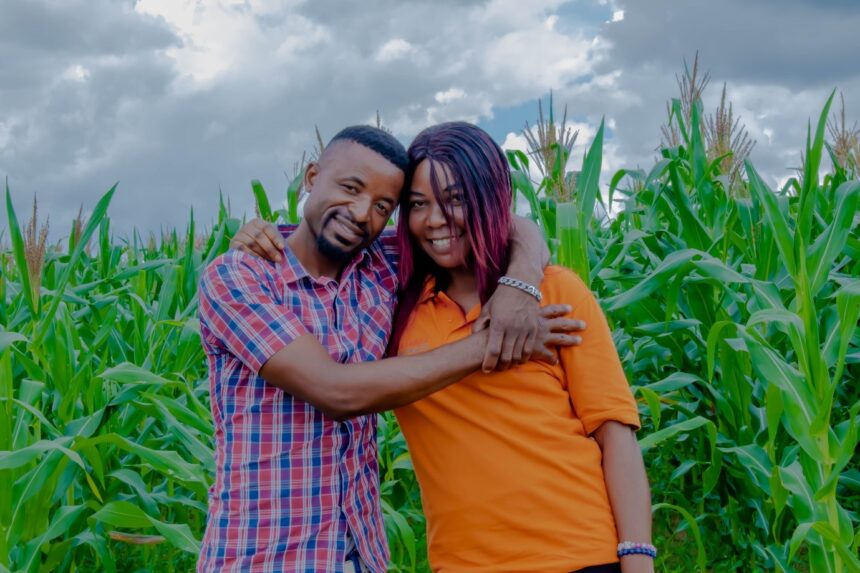….A Kalomo-based mother of four is in her second year pursuing a Diploma in Early Childhood Education at Monze College of Education
By SIMON MUNTEMBA
IT has always been a dream for Mercy Chilundika Buumba of Sibululi Village, Chief Sipatunyana in Kalomo that after completing her secondary school, she would pursue early childhood education and become a professional primary school teacher.
Sadly, when she completed her Grade 12 at Namwianga Mission Secondary School in 2010, she could not proceed to college to pursue her career due to lack of sponsorship as both of her parents who were supporting her died in 2011.
Considering that there was no one to pay for her tertiary education and fearing a future of complete darkness after the death of her parents, she got married in 2012, at the age of 20.
“Of course, I passed my Grade 12 final examinations with very good results but I was unable to enrol at the college because there was no money. Actually, I lost both of my parents in 2011, a year just after completing my Grade 12. Thus, my dream of becoming a teacher was somehow shattered.
I ended up getting married in 2012 but the pain of not pursuing my dream continued eating me up, especially when I saw some of my former classmates working as nurses and teachers,” she recounted.
Ms. Buumba, 33, is a housewife, married to Gridwell Buumba and together they have four children.
As subsistence farmers who relied on rain-fed agriculture for years, Ms. Buumba narrated that in the past, life was hard for her family as they did not have a sustainable source of income due to declining agricultural productivity.
While Ms. Buumba and her family knew that establishing alternative livelihoods that would build their resilience against extreme weather events such as droughts was the only way to better their lives, they lacked access to affordable credit and financial services.
According to her, due to lack of start-up capital to venture into an alternative livelihood, her family lived in abject poverty with no hope of a better future.
Ms. Buumba’s experience is just a tip of an iceberg as vulnerable people in rural areas, especially women and girls, are disproportionately lacking access to financial services and credit, which has been one of many contributing factors that perpetuate poverty, leading to early marriages or resorting to unsustainable practices such as overexploitation of natural resources.
In response to these challenges, CARE Zambia with support from the Czech Development Agency implemented the Building Livelihood Resilience to Climate Change (BLRCC) Project with the overall goal of creating more secure and resilient livelihoods for the poorest smallholder farmers and their households.
The three-year US$818, 133 BLRCC project which was implemented from July 1, 2020 to June 30, 2023 also facilitated the formation of savings and credit groups as a way of encouraging vulnerable members, especially women and girls, to save and access credit through their pool of savings.
Through the project, women were encouraged to initiate income-generating ventures so that they are self-sufficient and be able to increase their resilience and response to climate change impacts.
In addition, members of the groups were trained in financial literacy and business management to help them improve their businesses and enhance their livelihoods.
One of the success stories of the BLRCC Project is Blessings Savings Group in Moonde Ward of Kalomo, where notable impact has been made in lifting the community and individual families out of poverty through enhanced economic participation. The group consists of 15 members from within the community.
Fortunately, Ms. Buumba is one of the Blessings Savings Group members who got a soft loan to start a personal business of selling goats, which now helps her to pay for tertiary education and support her family, including school-going children.
It was in the principle of never turning back that from the moment she got a soft loan from the savings group, Ms. Buumba decided to use it as a start-up capital to bail herself out of the bondage of extreme poverty, and rekindle her childhood dream of pursuing early child education so that she becomes a teacher.
In an interview, Ms. Buumba said she never thought she would one day own a business and get back to school for further studies, adding that her life took a turn for the better when she joined Blessings Savings Group.
She explained that after getting a K2, 500 soft loan from the group in 2022, she ordered goats and took them to Kasumbalesa border (between Zambia and DRC) for resale where she made approximately K5, 000 profit.
With a happy smile, Ms. Buumba attested that in 2023, using the profit made from her business, she enrolled as a self-sponsored student at Monze College of Education, where she is in the second year pursuing a Diploma in Early Childhood Education.
“I owe it to Blessings Savings Group, championed by CARE Zambia. I managed to start a family business with the K2, 500 soft loan that I got from the group at 10 percent interest.
And from the profits made, I’m now able to support my family financially, and pay my own school fees at Monze College of Education where I’m a second year student,” Ms. Buumba said.
She added: “Through the group, my fellow women in our community are also supporting their families, including meeting their school-going children’s needs. It is really helping us. Unlike in the past, we are now able to buy uniforms and books for our school-children.”
To ensure a more secure and resilient livelihood for the community, members of the group including Ms. Buumba were also trained in climate smart agriculture (CSA) practices under the BLRCC Project.
Ms. Buumba said through the project, she has learnt diversified sustainable agricultural practices which she was using at household level to increase her source of income.
With skyrocketing prices of synthetic fertilizers on the market, Ms. Buumba said she just prepares her own manure, which is working wonders in their maize field.
“We are using animal manure and with the profit from the sale of maize after harvest, we bought more goats and seeds for the next farming season.
I now intend to get another loan to expand our family business so that it becomes easier to repay the loan as I concentrate on my studies,” she said.
She said the group meets twice every month to discuss how to promote their shares while at the same time getting soft loans at 10 percent interest per month.
Seeing the benefits, her husband also joined the savings group and fully supports his wife in running the business.
In Ms. Buumba’s own words: “My husband has been supportive throughout, I would have not succeeded without his support. As I go to college, my husband remains running our business to ensure that we are able to pay back the loan. In fact, after seeing the benefits, he was inspired to join the savings group.”
Meanwhile, her husband, Gridwell Buumba pays great tribute to CARE Zambia and the Czech Development Agency for empowering women including his wife through the BLRCC Project.
Mr. Buumba said had it not been for the project intervention, his family would have continued wallowing in poverty and engaging in unsustainable practices with no hope of taking his wife back to school.
Mr. Buumba was also full of praise for his wife. He said all he dreamed about all along was to have a sustainable source of income that would enable him to support his family and sponsor his wife’s tertiary education, which fortunately she was actualising.
“After getting a soft loan from the savings group, my wife brought the money home so that we can start a small family business and it has been successful. I was actually inspired to join after seeing my wife’s positive contribution at our home,” said Mr. Buumba who could not hide his joy.
He added: “I think once she graduates, I will also follow suit and pursue some studies in accounting. I have always wanted to be an accountant. I know when she gets employed after graduating next year, she will also support me to pursue my career.”
Mr. Buumba also advised other married men to support their wives to ensure they realise their full potential.
“Let my fellow men not be insecure when they see their wives pursuing their careers but offer them the necessary support. By supporting your wife, you are actually empowering her to help you take good care of your family,” he said.
Speaking after having visited some beneficiaries of the BLRCC Project in Kalomo, CARE Zambia programme manager for agriculture and climate, Jeston Lunda expressed happiness that the project was yielding results as evidenced by the diversified livelihoods that the communities had adopted.
Mr. Lunda also noted with happiness that the project had made tremendous strides in promoting women’s participation in income-generating activities through savings and credit groups.
He said savings groups have proved to be instrumental in propagating financial inclusion, particularly among rural women who tend to lack access to affordable credit and financing options.
“We are integrating issues of local financing through village savings and lending associations which have been formed across these communities. This is done because there is a challenge of access to finances especially among women and girls who we have put at the centre because of inequalities they have faced for some time,” Mr. Lunda said.
Mr. Lunda also said it was gratifying to note that the project has helped the community to adopt practices aimed at increasing productivity and enabled them to improve returns from their economic activities, while reducing pressure on the environment and natural resources.
This development has also elated Kalomo District Commissioner, Joshua Sikaduli, who thanked Care Zambia for supplementing the government’s efforts in uplifting the living standard of the vulnerable people in the community through various empowerment programmes.
Mr. Sikaduli also said the government is keen to see that more women and girls access secondary and tertiary education so that they can realise their full potential.
Indeed, due to the project intervention, there has been a significant improvement in terms of quality of life for group members. For instance, some like Ms. Buumba have started personal businesses, bought goats and farm inputs to improve their harvests, all through the savings and credit group feature of the BLRCC Project. This has built resilience in them.
Not only has the community savings and credit group helped Ms. Buumba to build her resilience in the face of climate change, it has also made it possible for her to achieve her childhood dream of pursuing primary education and becoming a professional teacher.